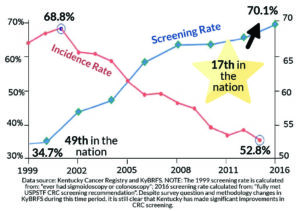
Kentucky ranks number one in cancer overall in the nation and is among the highest of the states in colorectal cancer rankings, according to the American Cancer Society. Colon cancer can be prevented with early screening and treatment when found in early stages. The Kentucky Department for Public Health (KDPH) is working to address the problem of colon cancer in the Commonwealth with the introduction of the Kentucky Colon Cancer Screening Program (KCCSP) in 2008.
The primary functions of KCCSP are to increase awareness and education about colon cancer screening and elevate access to screenings. The KCCSP Advisory Committee meets monthly to provide oversight and report annually to the Kentucky legislature. Continued barriers of no insurance or high out-of-pocket expenses prevent Kentuckians from obtaining the service.
Currently, partners across the state have received funding to provide support to those in need of screening or surveillance colonoscopy. Those sites in the region are: Ohio County Hospital, Livingston County Hospital, Pennyrile District, Little Flower Clinic, and Big Sandy. Kentucky CancerLink, a non-profit organization focusing on patient navigation for all types of cancer, has also received funding to help with access to services outside of one of these regions.
Individuals who may be eligible for a free colonoscopy are between the ages of 45 and 75, are uninsured, and are Kentucky residents. If there is a family history of colon cancer, or certain health issues that increase the risk of colon cancer, they may also be eligible for a colonoscopy before age 45. Financial eligibility is based on individual annual income that is at or below 300% of the federal poverty guidelines.
 Furthermore, individuals with high deductible insurance, who have had polyps removed in the past and need a follow-up colonoscopy but are concerned about the cost, should check to see if they are qualified. This program can also cover individuals that do not have Medicare Part B coverage.
Furthermore, individuals with high deductible insurance, who have had polyps removed in the past and need a follow-up colonoscopy but are concerned about the cost, should check to see if they are qualified. This program can also cover individuals that do not have Medicare Part B coverage.
Though the Kentucky Colon Cancer Screening Program has transitioned to providing colonoscopies for eligible individuals, challenges remain in finding providers that are willing to take part in the program. Previously, funding was only used for at-home FIT (Fecal Immunochemical Test) Kits for uninsured Kentuckians. Expansion to include the underinsured and the ability to provide funding for colonoscopy screening has improved the standard.
A goal that has been put forth by the National Colorectal Cancer Roundtable is to screen 80% of every community in 2020. The Kentucky Colon Cancer Screening Program is designed to provide free colonoscopies to patients who might not otherwise get screened due to out-of-pocket expense or lack of insurance, and has the ability to make an impact towards that goal. Developing partnerships with colonoscopy providers will be a key factor in program success. We are looking forward to having those conversations.
If you are a Kentucky resident in need of a screening or surveillance colonoscopy or a provider with a patient that needs the service, but cost is an issue, or if you are a provider interested in learning more about ways to get involved, please contact Kentucky CancerLink at 859.309.1700 or toll-free 877.597.4655. For more information regarding risk factors of colon cancer, please visit www.kycancerlink.org.
Melissa Karrer is the assistant director of Kentucky CancerLink




